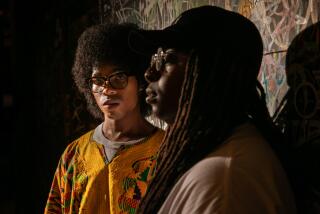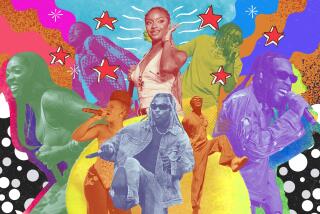Freedom to Celebrate for Black Mambazo
- Share via
IRVINE — Overthrowing a tyranny without having a blood bath is only slightly less rare an accomplishment than making an omelet without breaking eggs.
If the creative discipline and good spirits of the South African singing group Ladysmith Black Mambazo are any indication of the prevailing will and temperament of its homeland, South Africa has a great chance of completing its transition from racist tyranny to equal-rights democracy with joy, not further bloodshed.
Black Mambazo, the 10-man Zulu a cappella group that came to international fame in 1986 accompanying Paul Simon on his landmark “Graceland” album, did not turn its music to overt protest during the apartheid era that ended in 1994. But its performances tacitly made the point that no culture capable of producing such lively, accomplished and life-affirming art deserved to be under anybody’s heel.
Saturday at the Irvine Barclay Theatre, leader Joseph Shabalala and his men (three of them his sons) made a tacit declaration of freedom by not singing “Homeless,” the lovely plaint about dispossession that appeared on “Graceland” and is by far Black Mambazo’s most widely heard song in America. No longer politically dispossessed in their own country, and no longer in need of a famous patron in this one, the now well-established group devoted its two 50-minute sets mainly to fun and celebration.
Although Shabalala’s music is grounded in Christian faith, this show was less given to hymns and homilies than to humor and hot-running rhythm. In song after song, Black Mambazo’s team of bass voices turned into a mighty engine, driving the group through chugging cadences that were repeated at length, carrying a clapping, foot-tapping audience along until Shabalala decided it was time to raise his arm like a train man and pull down a final, whooshing chordal toot from his ensemble.
As always, the white-shod group gave shape to its musical energy with synchronized dancing, rigorous and athletic enough to make Motown’s finest look like amateurs at a high school talent night.
*
At the end of “Kangivumanga (I Disagree),” a song proclaiming a refusal to hate, the group stepped to a rapid, insistent cadence--”no-no-no”--giving a visual representation of how it may look someday when the saints really do go marching in.
Black Mambazo’s tight harmonies, the timing of the ensemble’s answers to Shabalala’s fluttering or piercing tenor-voice prompts, the precise interjection of rhythmic tongue-clicks or bird-like trills and guttural gulps, and the movement that accompanies the singing all combine to bespeak a breathtaking group discipline.
In some humorous bits that played off that singleness of purpose, members feigned dissension in the ranks and Shabalala cheerfully proclaimed mock disgust. In the second set, a couple of numbers involved freelance dancing and singing that paralleled the looseness of hip-hop. Black Mambazo created an illusion of near chaos, which, of course, requires lots of control.
Although it’s hard to get laughs from an American audience with a repertoire of songs sung mainly in Zulu, Black Mambazo established the lighthearted mood with some humorously deadpan introductory song-summations along the lines of “Things are upside-down because of you, talkative woman.” It had the full house of 756 roaring with the English lyrics to “Everything Is So Stupid,” a witty collaboration between Shabalala and American folk-pop songwriter Robin Batteau. Shabalala brought a gentle, knowing touch to the role of an exasperated, put-upon teen: “When I say what I think, they say, ‘Kid, you’re too young’ / And then when I’m quiet, they say, ‘Has the cat got your tongue?’ ”
Several songs focused on romantic hopes and upsets, among them a lighthearted song in English, “Hello My Baby.” Black Mambazo framed its performance with its core religious convictions and idealistic hopes, beginning with “King of Kings,” a prayer for peace, and ending with “God Bless Africa,” the hymn of the anti-apartheid movement that is now the South African national anthem. In between, this show suggested that one of the fruits freedom brings is greater leeway to just have fun.
More to Read
The biggest entertainment stories
Get our big stories about Hollywood, film, television, music, arts, culture and more right in your inbox as soon as they publish.
You may occasionally receive promotional content from the Los Angeles Times.











